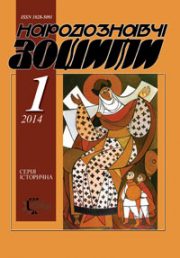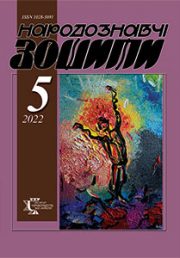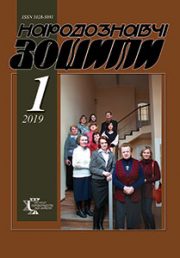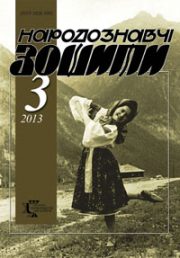The Ethnology Notebooks. 2020. № 2 (152), 361—369
UDK 316.35-057.56(=161.2)(100):[159.955.2:364.614.8](043.35)
DOI https://doi.org/10.15407/nz2020.02.361
ZAREMBA-KOSOVYCH Hanna
ORCID ID: https://orcid.org/0000-0003-3984-879X
PhD in Sociology,
Research Fellow in Department of Social Anthropology
The Ethnology Institute, National Academy of Sciences of Ukraine,
15, Svobody Avenue, 79000, Lviv, Ukraine,
Contacts: e-mail:ganna.zaremba@gmail.com
Abstract. Relevance: Ukrainian labour migration raises more and more questions about the formation and assessment of social justice in various fields, both in the country of origin and in the country of residence: legal, social, professional, family, cultural and other. Ukrainian migrant workers can take
a key position in the social field thanks to the available social capital, forming a system of dispositions of perception, evaluation, classification and internalization of European values, principles, interpretations of social justice in Ukrainian society.
The purpose of the article is to clarify the nature of the formation and functioning of perceptions of social justice among Ukrainian migrant workers. The object is Ukrainian migrant workers in the European Union. The subject is the perceptions of Ukrainian labour migrants about social justice.
The theoretical and methodological principles of the study were chosen based on the theory of the spheres of justice (M. Walzer), and the theory of principles of social justice (D. Miller). According to the concept of plurality of spheres of justice, each sphere of justice is closed, and is a particular social group or social institution (family, educational institutions, civic organizations, etc.). Each sphere of justice is governed only by one of the principles that are fundamental in a particular social group or in a particular social institution. D. Miller argues that social justice can only be determined through the consideration of «our judgments». It should be based on empirical data that would point to individuals’ life experiences. The theory defines three types of interrelationships between individuals: solidary, instrumental and civic.
For the collection of empirical data, the method of semi-structured interview was used. The empirical base of work consists of 75 semi-structured interviews, of which 52 — with Ukrainian labor migrants and 23 — with Ukrainians who had no experience of labor migration (they represent a comparative study group). Interviews were held in Austria, Italy, Poland and Ukraine.
The results distinguish «pure» and «plural» principles of social justice. The level of personalized trust and institutional trust, specificity of social communications influence the formation of perceptions about social justice. The results of the research indicate that the perceptions of social justice among Ukrainian labor migrants are similar to the perceptions of Ukrainians-non-migrants, with some age differences between youth and adults.
Keywords: social justice, principles of social justice, Ukrainian labor migrants.
Received 15.03.2020
REFERENCES
Walzer, M. (1983). Spheres of Justice: A Defense of Pluralism and Equality. New York: Basic Books.
Zaremba-Kosovych, H. (2015, 24—25 April). The perceptions about social justice: mobile and age. Sociology — Social Work — Regulation of Social Issues: Materials of IV All-Ukrainian. Conf. of young scientists (P. 34—36). Lviv [in Ukrainian].
Durkheim, E. (1996). About the division of social work. Moscow: Kanon [in Russian].
Macintyre, A. (1988). Whose Justice? Which Rationality? Notre Dame: University of Notre Dame Press.
Zaremba-Kosovych, H. (2016). The perceptions of social justice among Ukrainian labour migrants. Studia Securitatis. Security Studies Magazine, 2 (Vol. 10, pp. 76—87).
Zaremba-Kosovych, H. (2014—2015). Field materials collected in Austria, Italy, Poland and Ukraine. Author’s archive. Appendix D 240 [in Ukrainian].
Ivankova-Stetsiuk, O. (2012). Church in Migration Space: Ethnocultural Resources and Sociointegrative Potential of Religious Communities of Ukrainians: Monograph. Lviv: The Ethnology Institute of NANU; Commission of the UGCC on Migration [in Ukrainian].
Martyniuk, I. (2012). The sociology of trust in Ukrainian realities. Social dimensions of society, 4, 78—112 [in Ukrainian].
Giddens, A. (2011). Implications of modernity. Moscow: Praksys [in Russian].
Freyk, N. (2006). The concept of trust in P. Stompki’s research. Sociological research, 11, 10—18 [in Russian].







